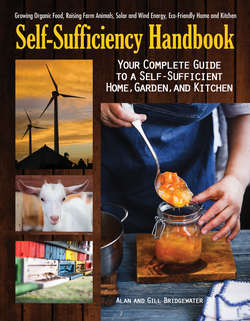Читать книгу The Self-Sufficiency Handbook - Alan Bridgewater - Страница 12
На сайте Литреса книга снята с продажи.
Country Living
ОглавлениеIf you were born on a farm, you know what country living is all about, but it is not as easy to fully appreciate the good, bad, and ugly possibilities if you have always lived in a city or small town. Let’s say that you live in the suburbs and you dream about being self-sufficient in the country. You have drawn inspiration from Thoreau’s Walden, you have thought it all through, you have crunched the numbers, and you are beginning to make real plans. You want to leave the gray town life behind, get back to what you consider a simple way of life, and generally live the dream. You’ve explored the countryside, looking at various options, and you may have even experienced a trial run of country living.
The not-so-strange thing is that many people are so wrapped up in romantic notions of living in the country that they forget about the sometimes harsh realities. In my opinion, country living is by far the easiest go-green option—land is less expensive, there is more space, and there is more choice—but there are also many town dwellers who are self-sufficient. Whatever you choose, you must consider the advantages and disadvantages before you make the move. Be aware that some of the advantages and disadvantages are different sides of the same coin.
ADVANTAGES
• The feeling of space can be spiritually uplifting for many people.
• You will enjoy the changing seasons and vistas.
• Generally, there is less pollution in the country. Some farmers still use chemical sprays, but at least you won’t have to battle with car fumes.
• If you give the locals a chance, they can be very caring and protective, especially if they see you as someone who is sincere and simply trying to do his or her best.
• There is much less noise pollution than in the city. You will be able to hear yourself think. You will be able to hear birds singing, your animals calling, the wind in the trees, and so on.
• There is little light pollution. You will be able to see the stars at night.
• If you have school-aged children, you will soon be drawn into school activities. Your kids will bring friends home, you will meet their parents, and you will soon get to know most of the kids and parents in your area.
• Costs for agricultural land are low. You can rent whole fields, spreads, or woods.
• Rural activities can be fun and affordable, and your kids can do things (such as build a camp in the fields) that they cannot do in the city or suburbs.
• You will have room to do your thing: take up riding, watch nature, build eccentric outdoor structures, sing while tending to the gardens—whatever interests you.
• If you have an independent nature, you will feel empowered.
• There are fewer people, so you will have more personal space.
Off-Grid Land
Although the self-sufficiency dream is all about going off-grid—no electricity, gas, or plumbing—you cannot easily achieve this ideal right from the start. For example, with our first place, we had the house and barn complete with a vast rainwater tank, all on 1 acre (.40 hectare), and that was about it. We knew there was a well somewhere, but it was hidden away in the undergrowth.
We more or less camped in the barn for the first year, using rainwater for drinking and washing, using bottled gas for cooking and lighting, and using an open fire for heating. It can be done, but is a lot of hard work. A much better scenario is to start out with modern utility services and gradually replace each of them with off-grid options.
DISADVANTAGES
• Living in the country can be very lonely at first, especially if you are seen as being different. Country people can be standoffish and wary if they perceive you as being sophisticated or uppity.
• Transportation costs can be high, especially if you live off the beaten path. You must work this into your budget.
• You will need a good, reliable van or truck, possibly a four-wheel drive vehicle. A breakdown in the country can be very difficult—dangerous, even—if you are not mechanically inclined.
• Livestock (pigs, goats, and so on) need around-the-clock care. You will still have to feed and tend to the animals on weekends and holidays, and you will need to arrange for their care if you need to leave the farm for any reason.
• Even relatively minor illnesses, such as a cold or a sprained ankle, can be a huge problem, especially if you have livestock to care for.
• School-aged children have to get to school. This can mean a long trip twice a day, or homeschooling the children, or even sending them to boarding school.
• Weather in the country makes more of an impact—snow, rain, drought, and wind can and will rule your life.
• Country living and darkness go hand in hand. A country lane or a place out in the wilderness will be completely dark at night.
• Mud! Mud will get everywhere.
• Living in a small community or village can be very restricting. Everyone around you will know your business.
• Pets, such as dogs and cats, sometimes find it impossible to settle into country life. If your dogs chase sheep or are allowed to roam, you will fall out of favor with your neighbors.
• If you leave a gate open, stock will run loose, and you will have problems. The simple rule with a gate is to close it after you open it.
